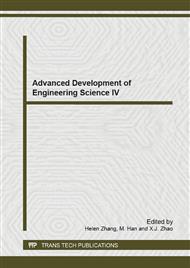[1]
Howon Lee, Taesoo Kwon and Dong-Ho Cho. An enhanced uplink scheduling algorithm based on voice activity for VoIP services in IEEE 802. 16d/e system. IEEE Communications Letters, VOL. 9 (2005), pp.691-693.
DOI: 10.1109/lcomm.2005.1496584
Google Scholar
[2]
R. Musabe, H. Larijani, B.G. Stewart and T. Boutaleb. A New Scheduling Scheme for Voice Awareness in 3G LTE. International Conference on Broadband and Wireless Computing, Communication and Applications (2011), pp.300-307.
DOI: 10.1109/bwcca.2011.46
Google Scholar
[3]
Dajie Jiang, Haiming Wang, E. Malkamaki and E. Tuomaala. Principle and Performance of Semi-Persistent Scheduling for VoIP in LTE System. International Conference on Wireless Communications, Networking and Mobile Computing (2007), pp.2861-2864.
DOI: 10.1109/wicom.2007.710
Google Scholar
[4]
Sunggu Choi, Kyungkoo Jun, Yeonseung Shin, Seokhoon Kang and Byoungjo Choi. MAC Scheduling Scheme for VoIP Traffic Service in 3G LTE. IEEE Vehicular Technology Conference (2007), pp.1441-1445.
DOI: 10.1109/vetecf.2007.307
Google Scholar
[5]
Riikka Susitaival, Michael Meyer. LTE coverage improvement by TTI bundling. IEEE Vehicular Technology Conference (2009), pp.1-5.
DOI: 10.1109/vetecs.2009.5073660
Google Scholar
[6]
Yong Fan, M. Kuusela, P. Lunden and M. Valkama. Downlink VoIP Support for Evolved UTRA. Wireless Communications and Networking Conference (2008), p.1933-(1938).
DOI: 10.1109/wcnc.2008.344
Google Scholar
[7]
Sung-Min Oh, Sunghyun Cho, Jae-Hyun Kim and Jonghyung Kwun. VoIP Scheduling Algorithm for AMR Speech Codec in IEEE 802. 16e/m System. IEEE Communications Letters, VOL. 12 (2008), pp.374-376.
DOI: 10.1109/lcomm.2008.072098
Google Scholar
[8]
Yong Fan, P. Lunden, M. Kuusela and M. Valkama. Efficient Semi-Persistent Scheduling for VoIP on EUTRA Downlink. IEEE Vehicular Technology Conference (2008), pp.1-5.
DOI: 10.1109/vetecf.2008.394
Google Scholar
[9]
3GPP TS 36. 321 v11. 5. 0 Release 11. Evolved Universal Terrestrial Radio Access (E-UTRA): Medium Access Control (MAC) protocol specification-Data Units, formats and parameters, (2014).
Google Scholar
[10]
M. Al-Rawi, R. Jantti, J. Torsner and M. Sagfors. Opportunistic Uplink Scheduling for 3G LTE Systems. International Conference on Innovations in Information Technology (2007), pp.705-709.
DOI: 10.1109/iit.2007.4430425
Google Scholar


